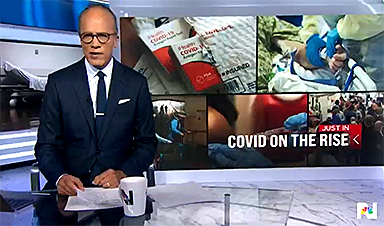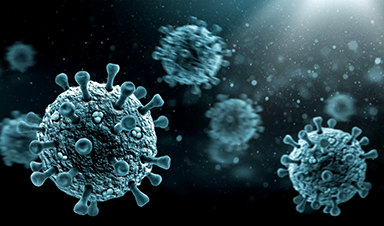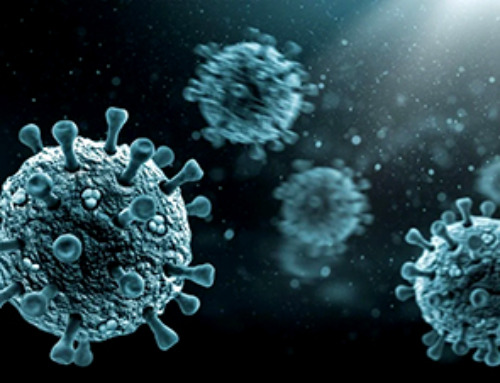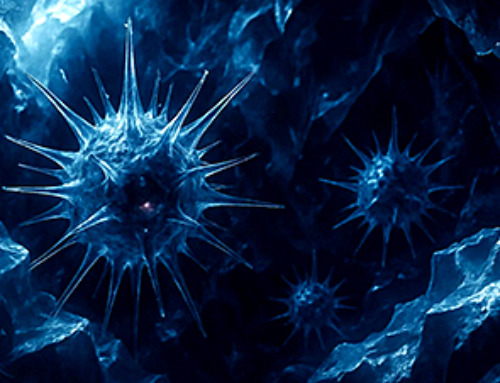Scientists can now show key differences in the blood of those who recover from Covid — and those who don’t.
More than three years into the pandemic, the millions of people who have suffered from long Covid finally have scientific proof that their condition is real.
Scientists have found clear differences in the blood of people with long Covid — a key first step in the development of a test to diagnose the illness.
The findings, published Monday in the journal Nature, also offer clues into what could be causing the elusive condition that has perplexed doctors worldwide and left millions with ongoing fatigue, trouble with memory and other debilitating symptoms.
The research is among the first to prove that “long Covid is, in fact, a biological illness,” said David Putrino, principal investigator of the new study and a professor of rehabilitation and human performance at the Icahn School of Medicine at Mount Sinai in New York.
Dr. Marc Sala, co-director of the Northwestern Medicine Comprehensive Covid-19 Center in Chicago, called the findings “important.” He was not involved with the new research.
“This will need to be investigated with more research, but at least it’s something because, quite frankly, right now we don’t have any blood tests” either to diagnose long Covid or help doctors understand why it’s occurring, he said.
Putrino and his colleagues compared blood samples of 268 people. Some had Covid but had fully recovered, some had never been infected, and the rest had ongoing symptoms of long Covid at least four months after their infection.
Several differences in the blood of people with long Covid stood out from the other groups.
The activity of immune system cells called T cells and B cells — which help fight off germs — was “irregular” in long Covid patients, Putrino said. One of the strongest findings, he said, was that long Covid patients tended to have significantly lower levels of a hormone called cortisol.
A major function of the hormone is to make people feel alert and awake. Low cortisol could help explain why many people with long Covid experience profound fatigue, he said.
“It was one of the findings that most definitively separated the folks with long Covid from the people without long Covid,” Putrino said.
The finding likely signals that the brain is having trouble regulating hormones. The research team plans to dig deeper into the role cortisol may play in long Covid in future studies.
Meanwhile, doctors do not recommend simply boosting a person’s cortisol levels in an attempt to “fix” the problem.
“There is no evidence that replacing cortisol in someone with long Covid would be a safe or effective thing to do,” Sala said.
The study also found that dormant viruses, such as the one that causes mononucleosis, Epstein-Barr, come alive again in long Covid patients. It’s unclear, however, whether those old viruses are causing symptoms or flagging a problem within the immune system.
“We were looking for signals, and we found them,” said Akiko Iwasaki, one of the researchers and a professor of immunobiology and molecular, cellular and developmental biology at the Yale School of Medicine. “Now what we need to do is home in on each of these signals and understand better how the disease has been driven by these signals.”
The investigators did not find significant evidence that long Covid is the result of an autoimmune disorder, in which the body attacks itself.
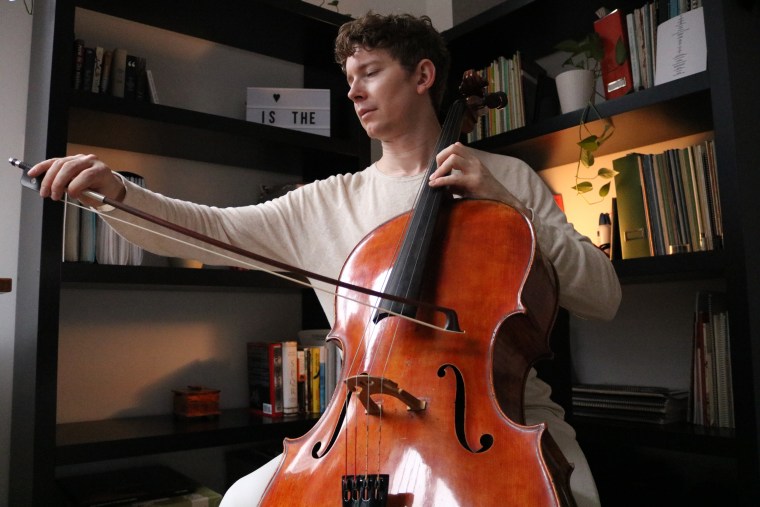
Dr. Clinton Wright, director of the National Institute of Neurological Disorders and Stroke’s division of clinical research, said additional studies will be necessary to find other ways Covid may lead to long-term symptoms. One theory is that the virus is hiding in brain tissue or other organs.
“We’re really interested in whether the virus still exists in reservoirs in the body,” he said. “It’s really hard to do that by measuring blood.” He was not involved with the new study.
Long Covid affects 1 in 13 U.S. adults, or 7.5%, according to the Centers for Disease Control and Prevention.
The findings offer hope to patients like Joshua Roman, 39, of New York City, who participated in the study.
“We’re in such a mysterious swamp of symptoms,” he said. “My long Covid treatment is just management of symptoms.”
Roman, a professional musician who plays the cello, takes daily medication to ease the lingering physical trembling that affects his ability to perform.
“It would be great if we could get to the thing that’s causing me to shake in the first place, but we still don’t know exactly what that is,” he said.
News
Enhanced Antibacterial Polylactic Acid-Curcumin Nanofibers for Wound Dressing
Background Wound healing is a complex physiological process that can be compromised by infection and impaired tissue regeneration. Conventional dressings, typically made from natural fibers such as cotton or linen, offer limited functionality. Nanofiber [...]
Global Nanomaterial Regulation: A Country-by-Country Comparison
Nanomaterials are materials with at least one dimension smaller than 100 nanometres (about 100,000 times thinner than a human hair). Because of their tiny size, they have unique properties that can be useful in [...]
Pandemic Potential: Scientists Discover 3 Hotspots of Deadly Emerging Disease in the US
Virginia Tech researchers discovered six new rodent carriers of hantavirus and identified U.S. hotspots, highlighting the virus’s adaptability and the impact of climate and ecology on its spread. Hantavirus recently drew public attention following reports [...]
Studies detail high rates of long COVID among healthcare, dental workers
Researchers have estimated approximately 8% of Americas have ever experienced long COVID, or lasting symptoms, following an acute COVID-19 infection. Now two recent international studies suggest that the percentage is much higher among healthcare workers [...]
Melting Arctic Ice May Unleash Ancient Deadly Diseases, Scientists Warn
Melting Arctic ice increases human and animal interactions, raising the risk of infectious disease spread. Researchers urge early intervention and surveillance. Climate change is opening new pathways for the spread of infectious diseases such [...]
Scientists May Have Found a Secret Weapon To Stop Pancreatic Cancer Before It Starts
Researchers at Cold Spring Harbor Laboratory have found that blocking the FGFR2 and EGFR genes can stop early-stage pancreatic cancer from progressing, offering a promising path toward prevention. Pancreatic cancer is expected to become [...]
Breakthrough Drug Restores Vision: Researchers Successfully Reverse Retinal Damage
Blocking the PROX1 protein allowed KAIST researchers to regenerate damaged retinas and restore vision in mice. Vision is one of the most important human senses, yet more than 300 million people around the world are at [...]
Differentiating cancerous and healthy cells through motion analysis
Researchers from Tokyo Metropolitan University have found that the motion of unlabeled cells can be used to tell whether they are cancerous or healthy. They observed malignant fibrosarcoma [...]
This Tiny Cellular Gate Could Be the Key to Curing Cancer – And Regrowing Hair
After more than five decades of mystery, scientists have finally unveiled the detailed structure and function of a long-theorized molecular machine in our mitochondria — the mitochondrial pyruvate carrier. This microscopic gatekeeper controls how [...]
Unlocking Vision’s Secrets: Researchers Reveal 3D Structure of Key Eye Protein
Researchers have uncovered the 3D structure of RBP3, a key protein in vision, revealing how it transports retinoids and fatty acids and how its dysfunction may lead to retinal diseases. Proteins play a critical [...]
5 Key Facts About Nanoplastics and How They Affect the Human Body
Nanoplastics are typically defined as plastic particles smaller than 1000 nanometers. These particles are increasingly being detected in human tissues: they can bypass biological barriers, accumulate in organs, and may influence health in ways [...]
Measles Is Back: Doctors Warn of Dangerous Surge Across the U.S.
Parents are encouraged to contact their pediatrician if their child has been exposed to measles or is showing symptoms. Pediatric infectious disease experts are emphasizing the critical importance of measles vaccination, as the highly [...]
AI at the Speed of Light: How Silicon Photonics Are Reinventing Hardware
A cutting-edge AI acceleration platform powered by light rather than electricity could revolutionize how AI is trained and deployed. Using photonic integrated circuits made from advanced III-V semiconductors, researchers have developed a system that vastly [...]
A Grain of Brain, 523 Million Synapses, Most Complicated Neuroscience Experiment Ever Attempted
A team of over 150 scientists has achieved what once seemed impossible: a complete wiring and activity map of a tiny section of a mammalian brain. This feat, part of the MICrONS Project, rivals [...]
The Secret “Radar” Bacteria Use To Outsmart Their Enemies
A chemical radar allows bacteria to sense and eliminate predators. Investigating how microorganisms communicate deepens our understanding of the complex ecological interactions that shape our environment is an area of key focus for the [...]
Psychologists explore ethical issues associated with human-AI relationships
It's becoming increasingly commonplace for people to develop intimate, long-term relationships with artificial intelligence (AI) technologies. At their extreme, people have "married" their AI companions in non-legally binding ceremonies, and at least two people [...]
